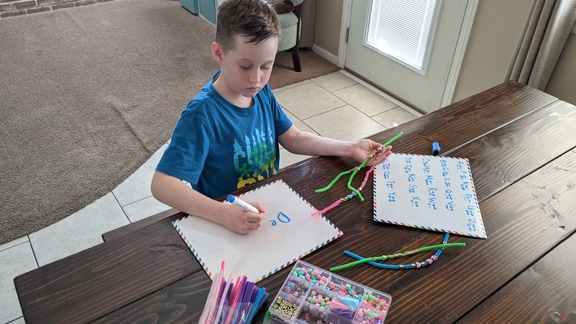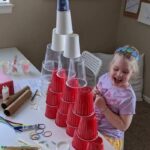Ever noticed how our kids can remember the lyrics to their favorite songs but sometimes forget where they put their school books? Just like teaching them to tie their shoes or ride a bike, strengthening their memory is another life skill we can help them with. It’s not just about acing tests or not forgetting chores—it’s about setting them up for success in all areas of life.
Table of Contents
Establish a Routine

Consistency is the key to memory enhancement. When children follow a routine, their brains start to recognize patterns, making it easier to predict and remember tasks. For example, if a child always does their homework at 5 PM, their brain will automatically get into ‘study mode’ at that time. This routine also reduces the mental load of deciding when to do tasks, allowing the brain to focus on the task itself. Moreover, routines provide a sense of security and predictability for children, reducing anxiety and promoting a conducive learning environment.
Use Mnemonics and Acronyms

Mnemonics and acronyms are memory aids that transform complex information into simple, memorable formats. Take “PEMDAS” (Please Excuse My Dear Aunt Sally) for instance. This acronym, representing the order of operations in math (Parentheses, Exponents, Multiplication, Division, Addition, Subtraction), turns a potentially confusing sequence into a catchy and memorable phrase. By encouraging your child to create their own mnemonics, you’re aiding their memory, fostering creativity, and making learning fun.
Visual Imagery

The brain processes visuals faster than text. By creating a mental picture, children can anchor information in their minds more effectively. For example, if they’re learning about the water cycle, visualizing the sun heating water bodies, forming clouds, and then rain pouring down can make the concept more tangible. This technique is especially useful for abstract concepts, turning them into vivid, memorable images. Over time, just thinking about the topic will automatically bring up the associated image, aiding recall.
Chunking Information

Our brains have a natural tendency to group information. This is why phone numbers are often broken down into chunks. Instead of remembering a ten-digit number, you remember two or three smaller groups of numbers. The same principle can be applied to study. If your child has a list of 20 vocabulary words, breaking them down into groups of five can make the task seem less daunting and improve retention. This method leverages the brain’s natural inclination towards patterns, making memory more efficient.
Repetition and Review

The age-old saying, “Practice makes perfect,” holds true for memory. The more often information is revisited, the more firmly it gets embedded in long-term memory. This is due to the strengthening of neural pathways with each review. Encourage your child to go over their notes or flashcards multiple times, spacing out the reviews. This spaced repetition takes advantage of the brain’s ability to reinforce memory over increasing intervals, ensuring better retention in the long run.
Teach What They Learn

The act of teaching reinforces understanding. When children explain a concept to someone else, they’re forced to process the information at a deeper level. This solidifies their grasp on the subject and highlights areas they might be unsure about. By playing the role of a ‘teacher’, they get to revisit and reinforce their knowledge. Plus, the feedback they receive can further aid in cementing the information. It’s a win-win: they get to enjoy the pride of teaching, and you get a glimpse into their learning process!
Stay Organized

Organization is a memory’s best friend. When children have a structured system in place, it reduces the cognitive load of trying to remember tasks or dates. Using tools like planners allows them to visually map out their responsibilities, making it easier to recall. Moreover, the act of writing or typing out information can further reinforce memory. Over time, this organizational habit can also improve their time management skills, making them more efficient learners.
Healthy Lifestyle Choices

The brain, like any other organ, benefits from a healthy lifestyle. Consuming a balanced diet ensures that the brain gets the necessary nutrients to function optimally. Foods rich in Omega-3 fatty acids, antioxidants, and vitamins play a crucial role in cognitive health. Regular physical activity increases blood flow to the brain, enhancing its functionality. And let’s not forget sleep – it’s the body’s natural way of consolidating memories. Ensuring your child gets adequate rest can significantly boost their memory retention.
Mind Games

Engaging the brain in challenging activities keeps it sharp. Think of it as a workout for the mind! Games that require strategic thinking, pattern recognition, or memory recall can enhance cognitive abilities. Whether it’s a classic game of chess, a jigsaw puzzle, or a memory card game, these activities stimulate the brain, making it more agile and improving memory. Plus, they offer a fun break from traditional study methods!
Create a Distraction-Free Study Zone

The environment plays a significant role in the learning process. A space riddled with distractions can hamper concentration, making it harder for information to move from short-term to long-term memory. By providing a dedicated, quiet study zone, you’re giving your child the best chance to focus. This space should be well-lit, comfortable, and free from potential distractions like televisions or noisy siblings. Over time, just entering this space can signal to the brain that it’s ‘study time’, further enhancing concentration.








